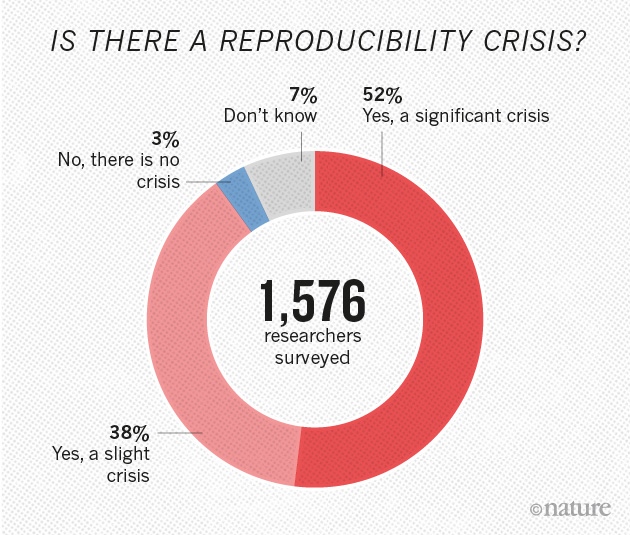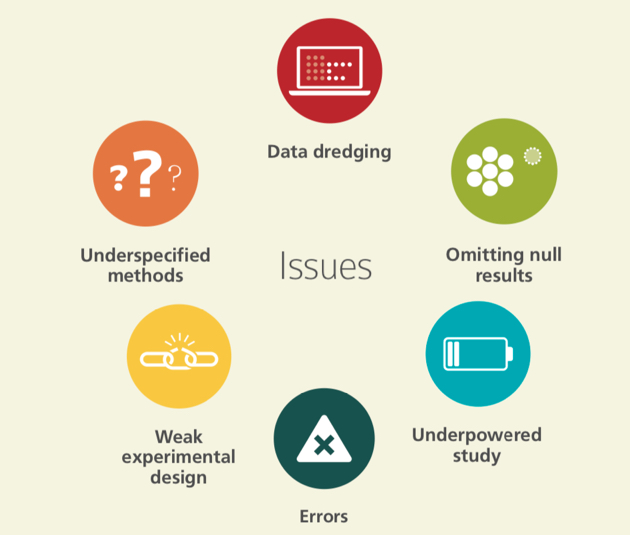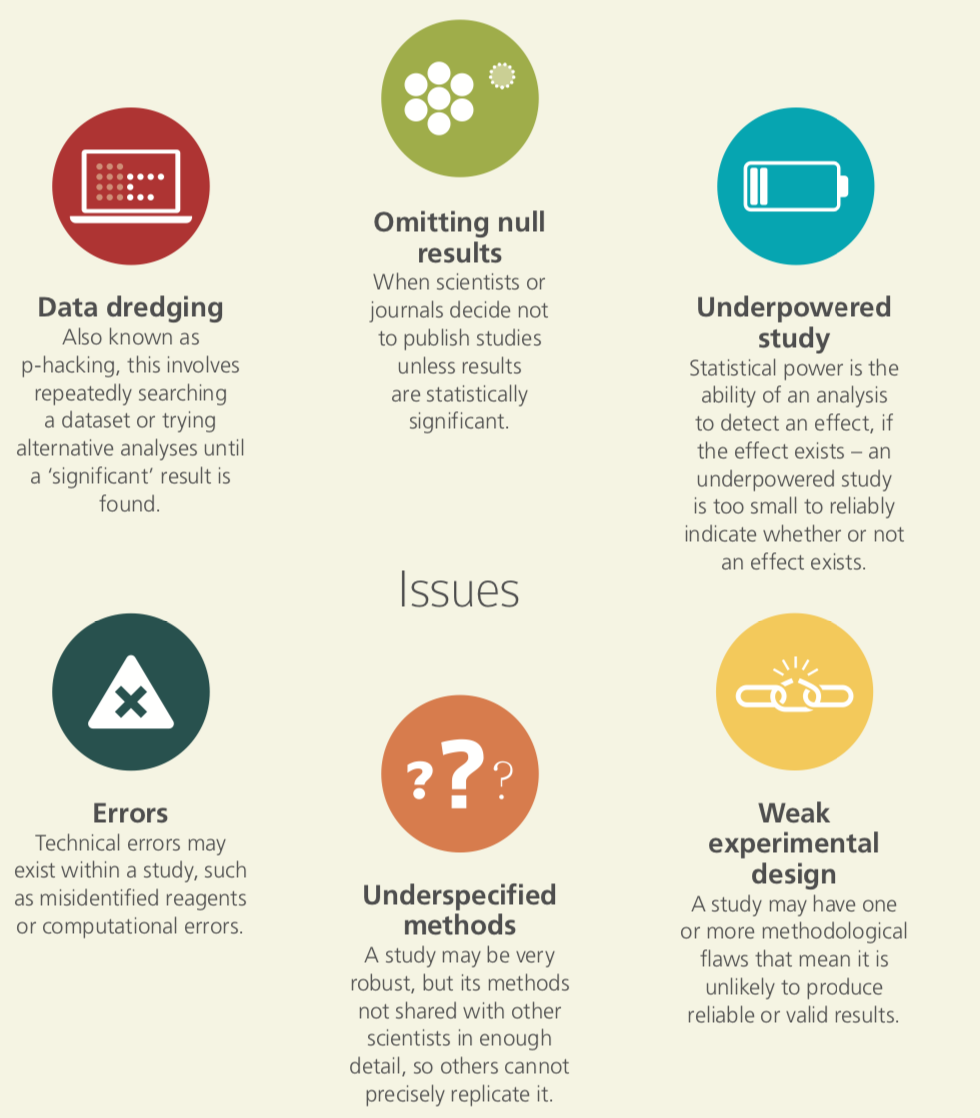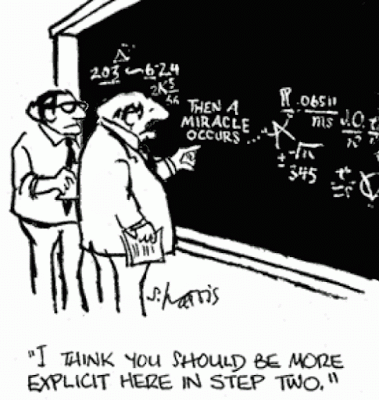class: center, middle, inverse, title-slide # Introduction to open science practices for Linguists ## James Brand ### <a href="mailto:james.brand@canterbury.ac.nz">james.brand@canterbury.ac.nz</a> </br> NZLS, Christchurch 2019 --- class: title-slide-final, center, middle background-image: url("images/NZILBB.png") background-size: 300px background-position: 98% 2% # Slides <font size="12" color="white">https://tinyurl.com/NZLS-workshop</font> --- # Outline ### .pull-left[ 12.30-3.00pm<br/><br/>3.00-3.30pm<br/><br/>3.30-4.30pm<br/><br/>4.30-5.00pm</br></br>5.00-5.30pm ] ### .pull-right[ Introduction to Open Science<br/><br/>Afternoon tea<br/><br/>Open Science Framework</br></br>R communities<br/><br/>Linguist in the wild ] --- .pull-left[ <br/> # Who am I? ## • Linguist (quantitative) ## • Open scientist ## • Early career researcher ] -- .pull-right[ <br/> # Who I am not? ## • Expert statistician/data scientist ## • Expert open scientist ## • Dictator ] --- class: title-slide-final, center, middle background-image: url("images/NZILBB.png") background-size: 300px background-position: 98% 2% # A quick survey <font size="12" color="white">http://etc.ch/znsQ</font> ??? [http://etc.ch/znsQ](http://etc.ch/znsQ) [https://directpoll.com/r?XDbzPBd3ixYqg8Yyl71VcRw9CeP4hGiDmylDb1SAa2](https://directpoll.com/r?XDbzPBd3ixYqg8Yyl71VcRw9CeP4hGiDmylDb1SAa2) --- # What is Open Science? ## There are lots of definitions... -- ## In it's simplest form... just doing 'normal' science but more .NZILBBgreen[transparently] -- <IMG STYLE="position:absolute; TOP:320px; LEFT:50px" SRC="images/normal_workflow.png"> -- <IMG STYLE="position:absolute; TOP:320px; LEFT:50px" SRC="images/open_workflow.png"> --- # The times they are a changin' <!-- <IMG STYLE="position:absolute; TOP:175px; LEFT:100px; WIDTH:500px" SRC="images/Reproducibility.jpg"></img> --> .pull-left[  ] .pull-right[  ] <a href="https://www.nature.com/news/1-500-scientists-lift-the-lid-on-reproducibility-1.19970" style="position:absolute; top:600px; left:100px; color:#9DA756">Baker (2016) <a href="https://acmedsci.ac.uk/file-download/38208-5631f0052511d.pdf" style="position:absolute; top:600px; left:620px; color:#9DA756">Academy of Medical Sciences (adapted) ???  --- # The times they are a changin' .pull-left2[ ### Publication models are evolving ### Making it easier to be open (online materials) ### Making it more beneficial to be open (citations) ### Making it more important to be open (funding) ] <IMG STYLE="position:absolute; TOP:175px; LEFT:650px; WIDTH:500px" SRC="images/Te_Reo.png"> <a href="https://www.nzlingsoc.org/journal/current-issue/" style="position:absolute; top:575px; left:650px; color:#9DA756">Te Reo --- # What is this workshop about? ## The purpose of this workshop is to introduce you to .NZILBBgreen[some] of the ways you can be more open -- ## This can involve introducing .NZILBBgreen[small] changes to your .NZILBBgreen['normal'] workflow -- ## You don't have to do .NZILBBgreen['everything'] to be an open scientist -- ## If you find some things useful great! ... .NZILBBgreen[Give them a go!] --- # Who is this workshop for? ## Everybody! -- ## Open Science should be .NZILBBgreen[fundamentally inclusive], everybody learns from each other -- ## If you have concerns/questions/criticisms of the things being discussed here, .NZILBBgreen[let us know] --- class: title-slide-final, center, middle background-image: url("images/NZILBB.png") background-size: 300px background-position: 98% 2% # Concepts and definitions --- <img src="images/taxonomy.png" alt="Taxonomy" style="position:absolute; left:100px; top:100px; width:900px"></img> <a href="http://oro.open.ac.uk/44719/2/kmi_foster_iknow.pdf" style="position:absolute; top:600px; left:100px; color:#9DA756">Pontika et al. (2015) --- class: title-slide-final, center, middle background-image: url("images/NZILBB.png") background-size: 300px background-position: 98% 2% # 1. Replicability --- # Replicability ## The ability to replicate the work of somebody else, using independently collected data, but derived from the same methods  <a href="https://www.awesomeinventions.com/cake-fails/" style="position:absolute; top:630px; left:100px; color:#9DA756">Hulk cake --- # Replicability ## .NZILBBgreen[Example 1] -- ### <b>Claim:</b> Flipping a coin 5 times gives this sequence:<br/>heads, heads, tails, tails, tails -- ### <b>Method:</b> Flip a coin 5 times -- ### <b>Result:</b> heads, heads, tails, tails, tails -- <img src="images/Nature.jpg" alt="Coin flipping" style="position:absolute; left:800px; top:200px; width:300px"></img> ## .NZILBBgreen[Try to replicate it yourself] <a href="https://en.wikipedia.org/wiki/Nature_(journal)" style="position:absolute; top:600px; left:800px; color:#9DA756">Brand (In press) --- # Replicability <img src="images/Replication.jpg" alt="Baker" style="position:absolute; left:100px; top:220px; width:500px"></img> <img src="images/Replication_crisis.png" alt="Open Science Collaboration" style="position:absolute; left:650px; top:220px; width:450px"></img> <a href="https://www.nature.com/articles/nature.2015.18248" style="position:absolute; top:600px; left:100px; color:#9DA756"> Baker (2015) <a href="https://science.sciencemag.org/content/349/6251/aac4716.short" style="position:absolute; top:600px; left:700px; color:#9DA756"> Open Science Collaboration (2015) --- # Replicability ## Why is it important? <ru-blockquote style = "font-size:40px">"The scientifically significant physical effect may be defined as that which can be regularly reproduced by anyone who carries out the appropriate experiment in the way prescribed"<br/><p align="right" style = "font-size:30px">Popper (1952: 23-24)</p></ru-blockquote> --- # Replicability (critiques and responses) ## Replications are not a good use of time and resources, they do not warrant publication -- ### Sure, they do take time and resources. If the original paper did not find the same result, would it have been published? Should we value .NZILBBgreen[null results] the same way as significant results? -- ## Who gets to decide which is the correct result? -- ### Nobobody. But perhaps it can .NZILBBgreen[stimulate discussion] between groups when different results are found and understand why that might be --- # Replicability (critiques and responses) ## The replication did not give the same result... this is because the participants were too different -- ### Sure, there will be differences from the original sample. Can this be explained from a .NZILBBgreen[theoretical standpoint]? If so, was it mentioned in the original submission? -- ## The replication did not give the same result... this is because the experiment was not run correctly -- ### Sure, no replication will be exactly the same. Did the original submission give enough .NZILBBgreen[reproducible] information to run it correctly? --- class: title-slide-final, center, middle background-image: url("images/NZILBB.png") background-size: 300px background-position: 98% 2% # 2. Reproducibility --- # Reproducibility ## The ability to reproduce the work of somebody else by using the same methods, data and analyses, as was originally reported  <br/> <a href="http://www.sciencecartoonsplus.com/pages/gallery.php">Harris (2019) --- # Reproducibility ## .NZILBBgreen[Example 1] ### <b>Claim:</b> 70 + 45 x 1.22 = 124.9 -- ### <b>Method:</b> Type 70 + 45 * 1.22 into a calculator -- ### <b>Result:</b> The calculator gives the value 124.9 -- <img src="images/calculator.gif" alt="Calculator" style="position:absolute; left:700px; top:220px"></img> <div<a href="https://gph.is/2CWu6gz" style="position:absolute; left:700px; top:500px">https://gph.is/2CWu6gz --- # Reproducibility ## .NZILBBgreen[Example 2] ### <b>Claim:</b> People attending this workshop are statistically more awesome than people not attending this workshop -- ### <b>Method:</b> Asked 100 random people to rate on a scale of 1-10 how awesome workshop attendees and a sample of non-workshop attendess are -- ### <b>Result:</b> I ran a mixed-effects regression model, predicting awesomeness rating, with workshop attendance (attended or not attended) as the main effect, which was significant (p < 0.05) --- # Reproducibility ## .NZILBBgreen[Example 3] ### <b>Claim:</b> Women are taller than men -- ### <b>Method:</b> Looked at various pictures of women and men in 3 different contextual settings -- ### <b>Result:</b> Women are taller than men p < 0.00001 -- <img src="images/Cruise.jpg" alt="Cruise" style="position:absolute; top:450px; width:900px; height:190px"></img> <div<a href="http://datacolada.org/31" style="position:absolute; top:650px">http://datacolada.org/31 -- <img src="images/Teachers.jpg" alt="Teachers" style="position:absolute; top:450px; width:1050px; height:190px"></img> <div<a href="http://datacolada.org/31" style="position:absolute; top:650px">http://datacolada.org/31 -- <img src="images/Referee.jpg" alt="Referee" style="position:absolute; top:450px; width:1050px; height:190px"></img> <div<a href="http://datacolada.org/31" style="position:absolute; top:650px">http://datacolada.org/31 -- <div<a style="position:absolute; left:500px; top:100px; font-size: 50px; color: red">Just because it is reproducible,<br/>doesn't make it reliable evidence --- # Reproducibility ## Small steps towards being more reproducible (we will revisit these later) -- ### Share your data, code, materials, anything that you have -- ### Ensure the things you share can be understood by others -- ### Don't manual edit data files (in Excel) then overwrite the master file -- ### Try to code, not click -- ### Idenitfy errors, don't hide them --- class: title-slide-final, middle background-image: url("images/hansel_gretel.jpg") background-size: contain ??? The second time, Hansel lays a trail of breadcrumbs to follow home --- # Reproducibility ## Ways being reproducible makes things easier (for myself) -- ### 1. It makes me more organised -- ### 2. It makes me understand what I have been doing -- ### 3. It makes me more confident -- ### 4. It (eventually) makes me more efficient -- ### 5. It makes me identify errors --- # Reproducibility ## Ways being reproducible makes things easier (for others) -- ### 1. It allows others to understand your workflow -- ### 2. It allows others to learn -- ### 3. It allows others to pick up where you left off -- ### 4. It allows other to reproduce your work -- ### 5. It allows others to identify errors --- class: title-slide-final, middle background-image: url("images/Comic.png") background-size: contain <a href="http://www.phdcomics.com/comics/archive/phd031214s.gif" style="position:absolute; top:630px; left:100px; color:#9DA756">phd comics --- --- class: title-slide-final, middle background-image: url("images/NZILBB.png") background-size: 300px background-position: 98% 2% # 3. Pre-registration --- # Pre-registration ## The process of declaring key aspects of your research plan, prior to actually undertaking the research, using a time-stamped document <img src="images/Preregister.png" alt="Cruise" style="position:absolute; top:400px; width:500px;"></img> <a href="https://osf.io/prereg/?utm_source=cos_site&utm_medium=get_started_button&utm_campaign=PreReg_Challenge" style="position:absolute; top:600px">Open Science Framework pre-registration --- # Pre-registration ## Why bother? -- ### <b>p-hacking:</b> when you decide to modify, change or adjust the original analysis approach to .NZILBBgreen[find] your p < 0.05 result -- ### <b>HARKing (Hypothesising After Results are Known):</b> when you decide to modify, change or adjust the original hypotheses to .NZILBBgreen[suit] your p < 0.05 result -- ## .NZILBBgreen[Pre-registration facilitates openness about what your original intentions were] --- # Pre-registration ## .NZILBBgreen[p-hacking example] ### You generate a hypothesis ### You collect data from 15 participants to test the hypothesis ### You choose to look at the data and run your analyses ### The results are significant ### You think you should probably collect more data, but decide not to --- # Pre-registration ## .NZILBBgreen[HARKing example] ### You generate a hypothesis ### You collect data from 50 participants ### You choose to look at the data and run your analyses ### The results do not support your hypothesis ### You change your hypothesis and generate a new one that suits the results --- # Pre-registration ## p-hacking and HARKing are generally seen as not good practice ## They will likely result in studies that are low in power ## Or studies that do not have a strong theoretical motivation ## .NZILBBgreen[Pre-registering your studies, where you define your hypotheses, methods, analysis **BEFORE** running the study, will minimise the likelihood of these issues] --- # Pre-registration ## Benefits? ## You .NZILBBgreen[formulate] your ideas from the outset ## It provides a .NZILBBgreen[time-stamped] version of your plan ## It allows .NZILBBgreen[others] to understand what you intended to do and why you chose to do it ## It is .NZILBBgreen[rewarding] when you plan works out, .NZILBBgreen[informative] when it does not --- # Pre-registration ## If I pre-register, am I stuck with that plan forever? ### No. You can .NZILBBgreen[update] your pre-registration in response to the development of the project. Just try to avoid doing so after data collection ## If I pre-register, do I have to state a clear hypothesis? ### No. Hypotheses can be .NZILBBgreen[confirmatory], where you have a clear prediction about your results, or they can be .NZILBBgreen[exploratory], where you do not have a clear prediction about the results.<br/> .NZILBBgreen[Both are fine!] As long you specify in the first instance. --- <img src="images/Preregistration_hypothesis.png" alt="Hypotheses" style="position:absolute; top:130px; left:70px; width:1100px;"></img> <img src="images/Preregister.png" alt="Preregister" style="position:absolute; top:25px; left:70px; width:400px;"></img> <a href="https://cos.io/prereg/?_ga=2.176235308.886825152.1574745813-1923398288.1574630497" style="position:absolute; top:600px">Centre for Open Science --- # Pre-registration ## Does it have to be very detailed? ### No. You can add as much detail as you want. Just be clear and honest. ## Does it take long? ### No. They can be completed in a few minutes. Deciding what to pre-register might take longer, but that is the reason pre-registration is sensible... .NZILBBgreen[it lets you decide on what you are going to do] --- # Pre-registration ## Is there a template? ### Yes. We will complete one in the next part of the workshop ## What if things don't turn out as I predicted? ### That is doing science! If your results don't match your expectations, .NZILBBgreen[that is the result to report], there will be a reason why. Ultimately, these results should carry the same weight as 'publishable' results --- # Pre-registration (2.0) ## Registered Reports ### Submit your research plan for peer-review, .NZILBBgreen[before data collection and analysis], normally with provisional acceptance to the journal -- ## Benefits? ### Makes any result a 'worthy' result ## See [https://cos.io/rr/](https://cos.io/rr/) --- class: title-slide-final, middle background-image: url("images/NZILBB.png") background-size: 300px background-position: 98% 2% # 4. Open access --- # Open access ## Making your research avaialable and accessible online, for free, for everybody -- <img src="images/Banks1.png" alt="Banks" style="position:absolute; top:300px; width:700px;"></img> <a href="https://link.springer.com/article/10.1007/s10869-018-9547-8" style="position:absolute; top:625px">Banks et al. (2019) --- # Open access ## Making your research avaialable and accessible online, for free, for everybody <img src="images/Banks2.png" alt="Banks" style="position:absolute; top:300px; width:840px;"></img> <a href="https://link.springer.com/article/10.1007/s10869-018-9547-8" style="position:absolute; top:625px">Banks et al. (2019) --- # Open access <iframe width="1500" height="500px" src="https://www.youtube.com/embed/L5rVH1KGBCY" frameborder="0" allow="accelerometer; autoplay; encrypted-media; gyroscope; picture-in-picture" allowfullscreen></iframe> --- class: title-slide-final, middle background-image: url("images/UC.png") background-size: contain <a href="https://blogs.canterbury.ac.nz/intercom/2019/11/05/citation-advantage-for-open-access-at-uc/" style="position:absolute; top:650px; left:100px; color:#9DA756">Tyson (2019) --- # Open access ## Different routes to Open Access? ## <a style = "color:green"> Green: </a> Allows users to deposit work prior to publication on accessible archive ## <a style = "color:gold"> Gold: </a> Makes the final published article accessible to all through the journal, at a cost to the author ## <a style = "color:#c0c0c0"> Diamond/platinum: </a> Essentially the gold route, but with no charge to the the author --- # Open access ## What types of licenses? ### Adding a license to your pre-print is always useful as it can restrict/open the access of it ## <a href="https://creativecommons.org/choose/"> https://creativecommons.org/choose/ --- # Open access ## Pre-prints! ### You can archive your .NZILBBgreen[pre-submitted] manuscript, i.e. before it has undergone peer review at at journal ### There are lots of options to do this, they are normally free (we will do an example with OSF) ### They are time-stamped, so harder to plagiarise ### Gets your work out there faster ### Journals .NZILBBgreen[normally] fine with this practice --- class: middle ## Pre-prints example: [https://osf.io/preprints](https://osf.io/preprints) --- --- class: title-slide-final, middle background-image: url("images/NZILBB.png") background-size: 300px background-position: 98% 2% # Thanks!